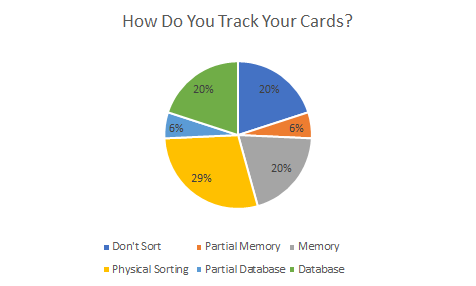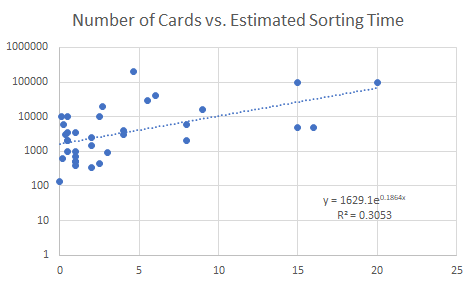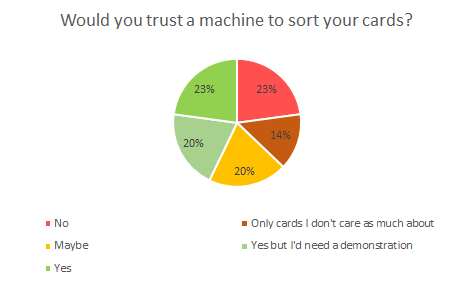Assessing the Situation
Before we started getting into the nitty gritty details of this project, we took a survey of the local Waterloo Magic:The Gathering community to figure out our objectives, constraints, and criteria. More than 30 people responded, and the data that we collected was useful in guiding the direction of the project.
The Query
We asked a total of 7 questions:
- How many MTG cards do you have?
- What do you estimate your collection to be worth?
- How much time do you spend organizing your cards? (hrs/month)
- How do you keep track of which cards you have?
- What percentage of cards do you have in sleeves?
- How long would you wait for your cards to be sorted?
- Would you trust a machine to sort your cards?
The Main Results
The responses we got were varied and interesting, but there were a few important patterns that we found.

About 46% of the players surveyed used their memory to track their cards or did not bother tracking their cards at all. 29% of players relied on physical sorting, and only 26% of players kept some sort of database. If only the players who maintain a database are considered to have a formal method of tracking their cards, 74% of players currently do not have a reliable method of cataloguing their collection.

The overall trend is that if a person had more cards, they spent more time per month sorting their cards. The most amount of time a player spent sorting their cards was upwards of 20 hours per month, which is approximately equal to 2.5 full work days. Most players took the time to sort their collection every month, with an average of 4 hours spent a month.

77% of players would trust a machine to sort their cards in some capacity (such as only sorting their less valuable cards), or could be coerced to allow a machine to sort their cards (if given a demonstration). In general, a good majority of players would be open to the idea of an automated card sorter.
Other Interesting Results
- Players were willing to wait an average of 7 seconds per card to be sorted automatically.
- The most expensive collection had an estimated worth of $250,000 CAD and 100,000 cards.
- The largest collection had 250,000 cards, the smallest had 130.
- The average collection size was about 3500 cards, with a value of $1600 CAD.
- The majority of cards in collections weren't sleeved, but when players did sleeve their cards, they typically had more than 10% of them sleeved.
- The average worth of a single card in a player's collection was less than a dollar.
So What Does This Mean?
From these results, it was seen that there is, in fact, a need and an interest in an automatic card sorting machine that could also catalogue a player's collection. A further analysis of the numbers we got helped shape our project constraints, criteria, and objectives. For example, a constraint we came up with is that we had to ensure that the cards wouldn't be damaged during the sorting process, as a lot of the trust in letting a machine sort a player's cards came from this assurance.
If you're interested in looking at the raw data we collected, feel free to check it out here!
Prev | Next